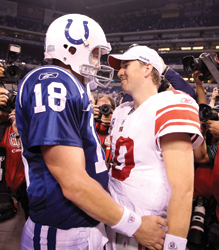Reebok has re-signed longtime endorsers Eli and Peyton Manning, the strongest evidence yet that while its brand will no longer be seen on NFL fields, the company isn’t abandoning marketing around the league.
During its decade as the NFL’s exclusive jersey supplier, Reebok used the Mannings and other high-profile quarterbacks in its marketing. With Nike displacing Reebok for NFL jersey rights over the next five years, the company could have paid a rights fee that would have kept its footwear on NFL fields, but Reebok officials recently declined to go in the same direction that Nike took for the past decade.
However, the decision to retain the Mannings, who have three Super Bowl rings between them, is an indication both of their marketing appeal and a “less is more” endorser philosophy for Reebok, which has adopted a fitness and training positioning following its 2005 acquisition by Adidas.
 |
Peyton Manning (left) has been with Reebok since ‘02, Eli since ‘04.
Photo by: GETTY IMAGES
|
“Clearly, we’re still using athletes, NFL or otherwise, in our marketing,” said John Lynch, Reebok vice president and head of U.S. marketing, noting that the brand’s other NFL players under contract include San Diego quarterback Philip Rivers, New England wide receiver Chad Ochocinco and Dallas linebacker DeMarcus Ware.
Peyton Manning has been a Reebok endorser since 2002. Eli has been a Reebok endorser since entering the league in 2004.
“Do we need hundreds of athletes? We don’t think so, especially after our NFL rights have expired,” Lynch said.
The Manning brothers will be the centerpiece of a back-to-school campaign for the new and lighter version of Reebok’s Zig technology, part of an industry trend toward lightweight footwear. The campaign is scheduled to be shot in June in Peyton Manning’s new hometown of Denver.
Prior to the Adidas acquisition, Reebok had on-field apparel deals with the NBA, NFL and NHL, the latter of which is still in place. In recent years, Reebok has shifted to a more focused training and fitness positioning, supporting newer technology like that used in its Zig and Flex shoes.
“NFL athletes, or any other pro athletes, are among the most fit people and they are a great showcase for our training shoes and ‘fit for life’ positing,” Lynch said.
While the Reebok brand is smaller and has been diminished since Adidas paid $3.7 billion for it in 2005, its focused marketing around fitness has begun to pay off, as Zig and Flex lines have been hits and the brand is seeing a renaissance of sorts.
“The [Reebok] brand is considerably smaller,” said Howe Burch, a former Reebok and Fila marketer who’s now executive vice president and managing director of Baltimore ad agency TBC. “The [fitness] path they’ve chosen fits well with their heritage, which is cross training. It is just much more on track.”
“Nike’s taking a lot of the air out of the room, so it is more difficult than ever for smaller brands,” said Matt Powell, an analyst for SportsOneSource. “But [Reebok President] Uli Becker has a clear vision, and they’ve shown they can develop new technology the market likes, so there’s been a decent amount of reinvention there.”
Lynch would not talk about Reebok’s sales specifically but said the brand has been growing in “better” channels of distribution, like sporting goods specialty retailers. He also said the brand is selling at better prices to a younger, more desirable consumer, with improved margins.
In addition to the NFL players, Reebok’s athlete roster includes baseball players David Ortiz, Jose Bautista and Justin Verlander, and a host of NHL players, including Sidney Crosby.
Reebok is still employing hip-hop musicians as endorsers for its Classics line, as well, including Tyga and Rick Ross.
However much the Reebok brand health has improved, the rationale for Adidas’ purchase of the company was that the combination of Adidas-Reebok brands would allow it to better compete with Nike, especially in the U.S. market. But Powell’s figures indicate the opposite has taken place domestically, showing Adidas’ U.S. retail market share has declined from 10 percent in 2005 to 5.9 percent in 2012. During the same period, Reebok’s U.S. retail market share dropped from 8 percent to 5.7 percent.
“Most of that share,” Powell said, “went to Oregon [Nike’s headquarters].”




